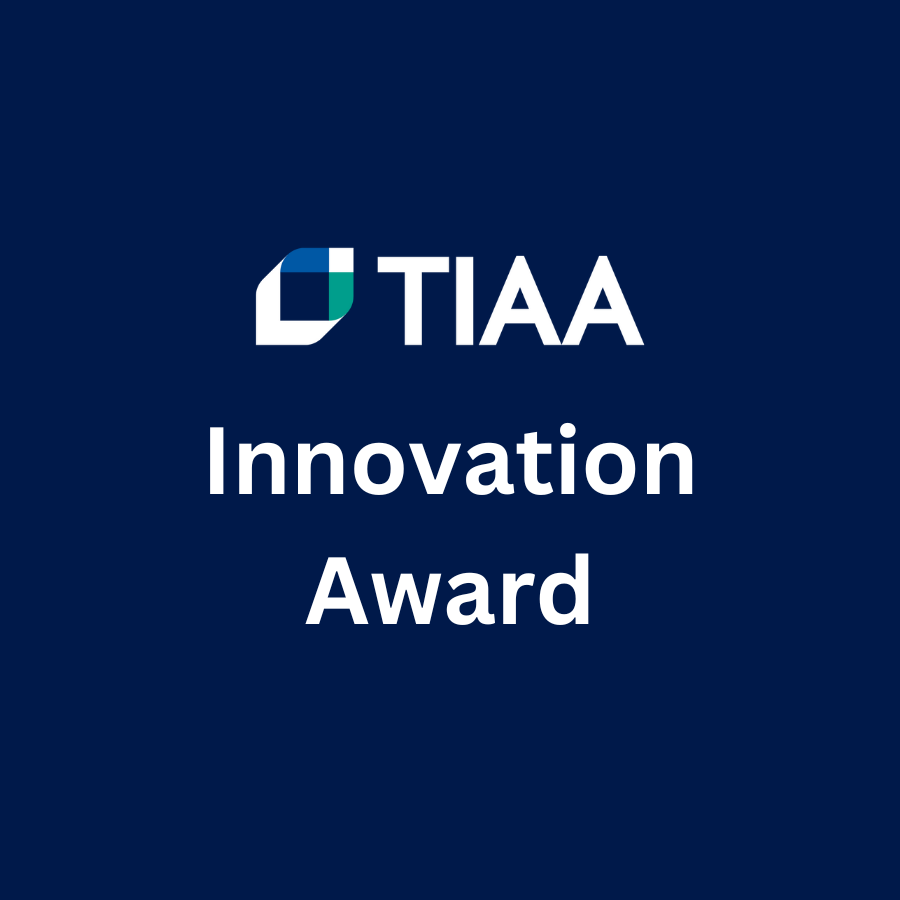TIAA Innovation Award
Glossary of Terms
| Term | Definition |
| Innovation | The process of developing and implementing new or significantly improved programs, services, or initiatives that utilize creative and effective approaches to enhance the overall success and experience of first-generation students on campus. This involves thinking outside the box, leveraging unique strategies, and fostering an environment that supports novel solutions to existing challenges, ultimately contributing to first-generation students' academic and personal growth. |
| Success | The effective implementation and positive impact of new or existing programs, services, or initiatives that creatively enhance campus-wide success for first-generation students. This includes achieving measurable improvements in academic performance, retention rates, and overall student satisfaction. Success is demonstrated through the ability to address and overcome challenges faced by first-generation students, fostering an inclusive and supportive campus environment that promotes their academic and personal growth. |
| Sustainability | The ability to develop and maintain programs, services, or initiatives that continuously support and enhance campus-wide success for first-generation students over the long term. This involves creating solutions that are not only effective and innovative but also durable and adaptable to changing needs and circumstances. Sustainability ensures that the positive impacts on first-generation students’ academic and personal growth are enduring, fostering a lasting, supportive, and inclusive campus environment. |
| Scalable | The capacity to expand and adapt programs, services, or initiatives to support a larger number of first-generation students across the campus without compromising quality or effectiveness. This involves designing solutions that can be efficiently scaled up to meet increasing demand, ensuring that the benefits of innovative approaches to enhancing first-generation student success can be extended to a broader audience. Scalability ensures that as the program grows, it continues to provide meaningful support and positive outcomes for all first-generation students. |
| Creative | The ability to generate original and innovative ideas that enhance campus-wide success for first-generation students. This involves thinking outside the box to develop unique programs, services, or initiatives that address first-generation students’ specific needs and challenges. Creativity ensures that solutions are not only effective but, also engaging and inspiring, fostering a dynamic and supportive campus environment that encourages academic and personal growth. |
| Intended Outcomes | The specific goals and measurable results that programs, services, or initiatives aim to achieve in enhancing campus-wide success for first-generation students. These outcomes can include improvements in academic performance, retention rates, and overall student satisfaction. Intended outcomes reflect the desired impact of innovative approaches, ensuring that the efforts lead to tangible benefits and positive changes in the academic and personal growth of first-generation students. |
| Indicators of Success | The specific metrics and benchmarks used to evaluate the effectiveness of programs, services, or initiatives in enhancing campus-wide success for first-generation students. These indicators include measurable improvements in academic performance, retention rates, and overall student satisfaction. They reflect the tangible outcomes of innovative approaches, demonstrating the extent to which the intended goals and positive impacts on first-generation students’ academic and personal growth have been achieved. |
| Historically Excluded Identities | Institutions of higher education were originally designed to accept and educate a particular cast. Over the years, policies, programs, and practices have evolved to recognize and honor the importance of different identities and experiences, including but not limited to race, ethnicity, gender, sexual orientation, and socioeconomic status. Despite these efforts, particular groups continue to be excluded. |
| Collaboration | The process of working together with various stakeholders, including students, faculty, staff, and external partners, to develop and implement programs, services, or initiatives that enhance campus-wide success for first-generation students. Collaboration involves sharing ideas, resources, and expertise to create innovative and effective solutions. It ensures that diverse perspectives are considered, fostering a supportive and inclusive environment that promotes the academic and personal growth of first-generation students. |
| Community Engagement | The active involvement and collaboration with the broader campus and local community to support and enhance the success of first-generation students. This involves creating partnerships, fostering relationships, and encouraging participation from various community members, including students, faculty, staff, alumni, and local organizations. Community engagement ensures that programs, services, or initiatives are inclusive and reflective of the diverse needs and perspectives of the community, promoting a supportive environment that contributes to the academic and personal growth of first-generation students. |
| Intersectional Approach | The method of addressing and understanding the diverse and overlapping identities and experiences of first-generation students to enhance their campus-wide success. This involves recognizing and considering factors such as race, gender, socioeconomic status, and other social identities that intersect and impact students’ experiences. An intersectional approach ensures that programs, services, or initiatives are inclusive and equitable, addressing the unique challenges and needs of first-generation students from various backgrounds, and promoting their academic and personal growth holistically. |
| Feasibility | The practicality and achievability of implementing programs, services, or initiatives designed to enhance campus-wide success for first-generation students. This involves assessing the availability of resources, time, and support needed to effectively execute the proposed solutions. Feasibility ensures that innovative approaches are realistic and can be successfully carried out, leading to meaningful and sustainable improvements in the academic and personal growth of first-generation students. |
| Unrestricted Funds | Financial resources are provided without specific limitations or conditions, allowing for flexible use in developing and implementing programs, services, or initiatives that enhance campus-wide success for first-generation students. These funds can be allocated as needed to address various challenges and opportunities, ensuring that innovative approaches can be effectively and efficiently executed. Unrestricted funds support the adaptability and sustainability of efforts to promote the academic and personal growth of first-generation students. |
| First-generation Student(s) | The first-generation college student definition has many nuances and may be defined as:
|
TIAA Innovation Award
Open to accredited 2- and 4-year higher education institutions, the Innovation Award will award up to $10,000 of unrestricted funds to creative or scalable solutions to advance the success of first-gen students.
